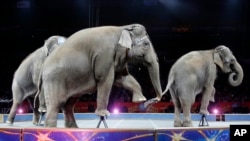For the very last time, elephants have performed at the Ringling Brothers and Barnum and Bailey Circus, billed as "The Greatest Show on Earth."
An Asian elephant carrying a performer holding an American flag kicked off Sunday's final elephant performance at an arena in the northeastern city of Providence, Rhode Island. This ends a tradition that has entertained audiences since circuses began in the U.S. two centuries ago, but that in recent years has been challenged by animal rights activists.
Six Asian elephants paraded around the ring during the performance, each holding the tail of the one in front of her. The animals will retire to Ringling Brothers' 80-hectare Center for Elephant Conservation in the southern state of Florida. Alana Feld, executive vice president of Feld Entertainment, which owns the circus, says the center has a herd of 40 Asian elephants, the largest in North America.
Their final performance was streamed live on Facebook and on the circus' website.
Elephants have been used in circuses in America for more than 200 years.
The Humane Society says more than a dozen circuses in the United States continue to use elephants. But none tour as widely or are as well-known as Ringling Brothers. It also is getting more difficult for circuses to tour with elephants. Dozens of cities have banned the use of bullhooks, which are used to train elephants. Some U.S. states also are considering such legislation.
No longer seen as performers
Just like in the classic Disney movie "Dumbo," elephants in the past have been dressed up as people and trained to do a range of tricks: play baseball, ride bicycles, play musical instruments, wear wedding dresses or dress in mourning clothes, said Ronald Tobias, author of the 2013 book "Behemoth: The History of the Elephant in America."
In Sunday's final performance, the giant creatures performed such routines as dancing on small platforms, standing on their hind legs and doing headstands.
The change at Ringling signifies a shift in Americans' understanding of elephants, Tobias said. People no longer see them as circus performers, "but sentient animals that are capable of a full range of human emotions."
Attitudes are shifting about other animals as well. Last month, Sea World announced it would end live orca shows and breeding. Ringling will continue to use other animals, including horses, lions, tigers, dogs and kangaroos, in its shows, Feld said.
Tobias said that as attitudes have changed, people are more interested in seeing elephants in a natural habitat such as a sanctuary, rather than in a circus or zoo.






